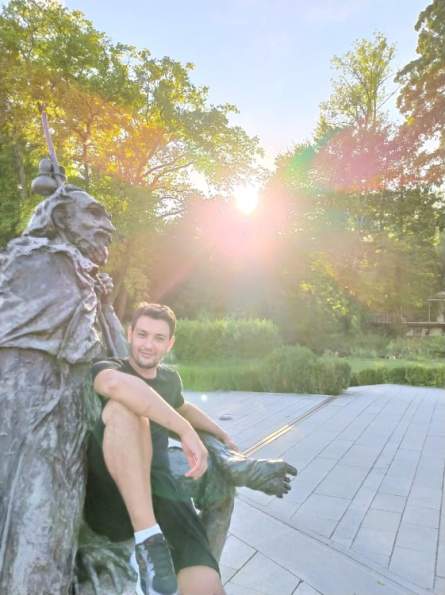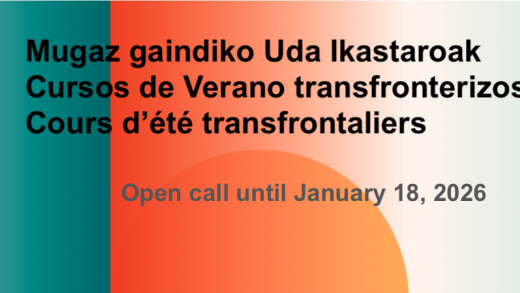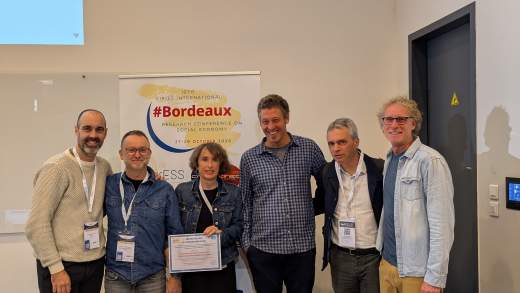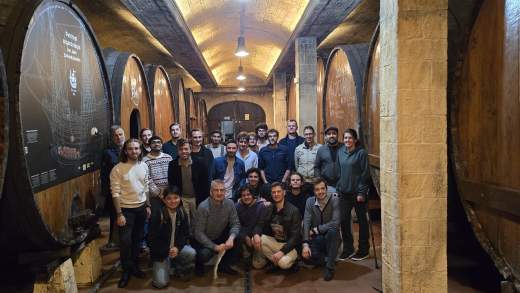Interview of PhD Student Braddenine Benhellal - Transmath co-supervised thesis

Bilbao - July 14th, 2022
"I hope that this work will help to change people's impression and feeling towards this discipline”
BCAM-UPV/EHU and University of Bordeaux PhD Student Badreddine Benhellal has defended his co-supervised thesis
Badreddine Benhelall has defended his co-supervised thesis Spectral analysis of Dirac operators on domains the last 6th of July. The main goal of the thesis is to investigate the spectral properties of two types of perturbation of the Dirac operator, which are singular from the point of view of scaling. Benhelall along with the supervision of Prof. Luis Vega, Basque Center for Applied Mathematics -BCAM – UPV/EHU and Prof. Vincent Bruneau of Mathematics of Bordeaux (IMB) - University of Bordeaux. Badreddine Benhelall graduated in 2016 with a bachelor's degree in mathematics from the University of Rouen. After he studied a Master's in Analysis, PDEs and Probabilities in the University of Bordeaux.
In 2018, he started his PhD as BCAM-UPV/EHU and University of Bordeaux. The dissertation project was part of the TRANSMATH cross-border laboratory between the Institute of Mathematics of Bordeaux (IMB) of the University of Bordeaux, the Basque Center for Applied Mathematics (BCAM) and the University of the Basque Country (UPV/EHU), which aims to strengthen the collaboration between institutions. After defending his PhD thesis, he is a postdoctoral researcher at BCAM at Linear and Non-Linear Waves research line where Prof. Luis Vega is the Group Leader.
The Dirac equation is one of the most fundamental equations of Mathematical Physics, it describes the motion of relativistic spin-1/2 particles, such as, electrons/positrons and quarks. Due to their applications in models of Graphene, Dirac operators (Hamiltonians) have gained interest in the recent physics literature. In particular, on domains with nonempty boundary, the choice of boundary conditions, self-adjointness, and spectral properties of Dirac operators are crucial in the arising of interesting theoretical questions.
The main purpose of the thesis was to better understand the boundary phenomena and spectral properties of Dirac operators. A large part of the thesis is concerned with the study of Dirac operators with delta interactions supported surfaces, which can be regarded as transmissions problems for the Dirac equation. Benhellal investigated the self-adjointness and the related spectral properties of the underlying Dirac operator, such as the phenomenon of confinement and the Sobolev regularity of the domain in different situations. The main achievement was to tackle the above problems, on the one hand for smooth and non-compact interaction supports, and on the other hand, under mild geometric measure theoretic assumptions on surface supporting the singular interaction. The second part of the thesis dealt with the large coupling problem for the Dirac operator. There he considered the coupling of the Dirac operator with a massive potential located in the exterior of a region of 3D Euclidean space, and investigated the behaviour of spectral quantities when the mass becomes large. This operator appears naturally in the study of the MIT Bag model in dimension 3 used in the description of quarks confinement in hadrons.
- What was the most interesting part of your thesis? What was the most challenging one?
I think the most interesting part of my thesis was access to research funding and opportunities from BCAM-UPV/EHU and the University of Bordeaux. This access allowed for extended fieldwork visits and participation in conferences, workshops, and courses, which made it easier for me to meet colleagues and make connections with institutions that significantly strengthened my thinking and work. As for the difficult part, I would say that I had to readjust to a different rhythm of life for the research work on my dissertation and for daily life in general.
- How was it being in a co-supervised thesis?
The fact that I have two PhD supervisors working on different research areas has been very beneficial to me. On the one hand, I can meet with them regularly, which is very important for a PhD student, and on the other hand, it has helped me a lot to develop my mathematical intuition, to learn to look back and to formulate the mathematics clearly. Thanks to their permanent availability to discuss and answer my questions, their rigorousness and their unceasing positivism and encouragement, my thesis went better than expected. Apart from the mathematical knowledge they have taught me, their human qualities, kindness and support have made these years pleasant and enriching.
- What impact will your thesis have within the Transmath LTC?
I believe it will have a positive impact, especially encouraging researchers from different institutions to collaborate more, strengthen existing collaborations, and create new collaborative projects that will especially involve students in joint supervision between these institutions. In this sense, I would also like to mention the conference on "The Dirac Equation”, organized in the framework of the TRANSMATH cross-border laboratory at the Institute of Mathematics of Bordeaux, which brought together people working on PDEs from relativistic quantum mechanics and fostered informal interactions and discussions on this topic.
- What impact will it have on the society?
Since my dissertation was more in a purely theoretical area of mathematics, there are usually very few theoretical discoveries that immediately change something in our lives. So, we can never know and therefore work for the future with the idea that everything that happens to understand something will one day be useful. Nevertheless, at the same time, I believe and hope that this work, which could be compared to a drop of water added to an ocean, will help to change people's impression and feeling towards this discipline.
- What are the challenges in your near future?
Well, it is always difficult to talk about the future and its challenges, yet I think the most important challenge I should face is to strengthen my skills, broaden my mathematical horizons, and conduct fruitful research by interacting with more collaborators.



